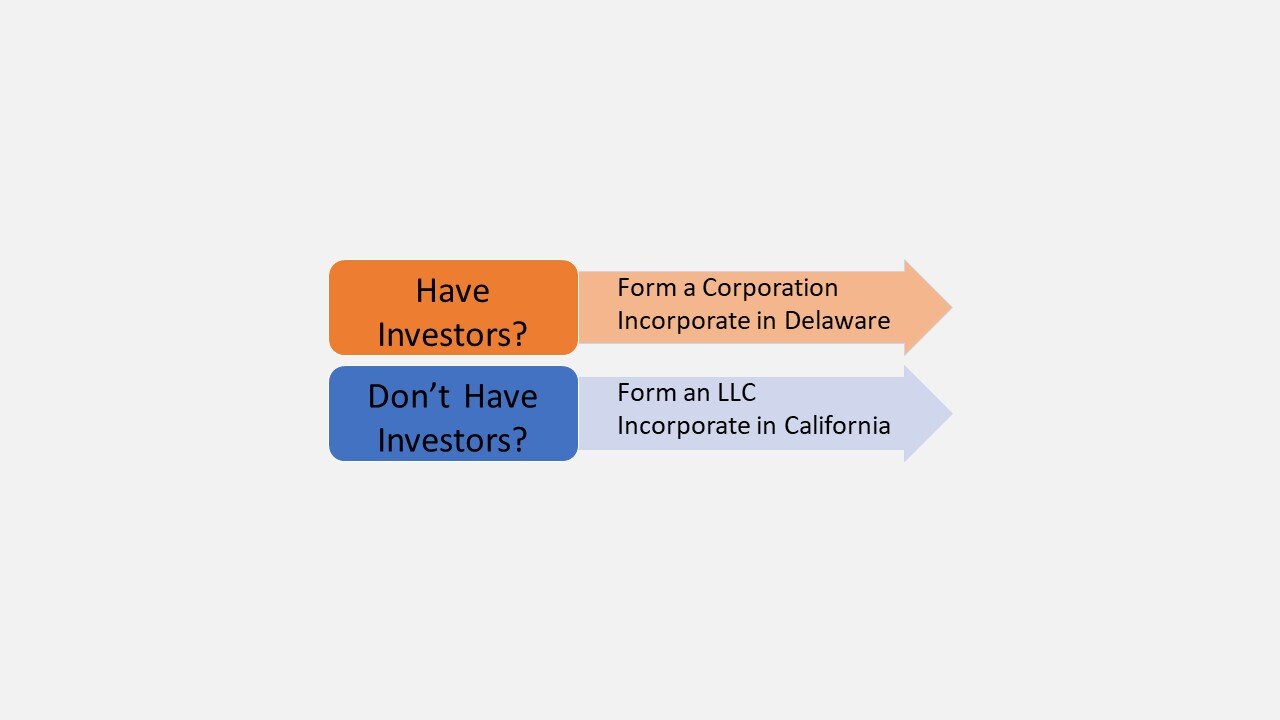Choosing the Best Entity for Startups
Which Business Entity is the Best for Startups in California?
The best entity for startups comes down to choosing between an LLC or a corporation. This is because both entities provide “limited liability protection,” which is absolutely crucial in protecting yourself and your business partners, if any. Limited liability protection both minimizes your personal legal liability and protects your personal assets.
What is Limited Liability Protection and Why Does it Matter?
In general, limited liability protection offers protection to the business’s owners where the owners are not personally liable to the actions of the business itself and also to the actions of the other owners. There are exceptions, though, where losing limited liability protection can be possible, but those exceptions usually occur if an owner intentionally acts in bad faith where the owner intentionally engages in misconduct or mischievous behavior.
Limited Liability Examples
For example, if there is not enough money or assets in your business to pay off any debts or court judgments against it, then your personal assets (such as your car, house, bank accounts and generally anything of value) cannot be used to pay off the debts or court judgements against the business. As a result, your personal assets, which are your assets outside of the business itself, are safe from creditors. Keep in mind, though, that this is in general and there are exceptions where this will not be the case.
What if you have co-founders/owners in your business? For example, if you have one co-founder and that co-founder, without your knowledge, committed fraud in a business contract with a vendor. The vendor then initiates a lawsuit against your business and names both you and your co-founder as individuals to be personally liable. With limited liability protection, you can likely have yourself removed as an individual from the lawsuit and thus, not be personally liable. However, the business may still be liable and the business assets may be used to pay for any damages from the fraud.
Is it better to have an LLC or a Corporation?
Generally, the choice between forming an LLC or a corporation comes down to one question – do you have or plan to have in the near future outside investors (investors who are not friends or family)? There are of course several other factors that play into whether an LLC or a corporation is best for your startup, but this is the primary factor. It is best to have a full discussion with a business lawyer.
Reasons Why an LLC is Better Than a Corporation
More often than not, an LLC will be the better choice, especially when you are just launching your startup without any outside investors. This is because LLCs offer a less costly and more flexible alternative to corporations while still providing you with the same level of limited liability protection as a corporation. Keeping costs low and being flexible are important when you are just beginning to build your business so you are able to have more money to invest in the business and have more structural flexibility to adapt to a new business strategy or to optimize the business’s tax situation.
The costs for forming and operating an LLC are lower than if your startup was a corporation, which includes lower government filing fees for forming your LLC over a corporation, lower legal fees, and generally paying less in taxes. LLCs also provide more flexibility, both administratively and for taxes as LLCs are less formal than corporations and thus, require less formalities to adhere to, such as not needing to hold an annual meeting. This also makes it easier for you to avoid losing your limited liability protection, which can occur when you do not adhere to the entity’s formalities. Additionally, LLCs allow you the opportunity to choose whether you would like your LLC taxed more as a pass through entity (sole proprietorship or partnership) or taxed as a corporation. Furthermore, an LLC provides the same level of limited liability protection as a corporation. LLCs offer a less costly and more flexible alternative to corporations while still providing you with the same level of limited liability protection.
You can either form your LLC in California or in Delaware. If you form your LLC in California, you can later convert your LLC into a Delaware corporation once you secure funding. Alternatively, you can form your LLC in Delaware first and then register your Delaware LLC with the California Secretary of State to be able to do business in California. A Delaware LLC can operate in California, but it must register with the Secretary of State first. Once you secure funding, you can then convert your Delaware LLC to a Delaware corporation.
Reasons Why a Corporation is Better Than an LLC
A corporation is generally better than an LLC once you secure funding from outside investors to raise capital or you would like to begin issuing a significant amount of equity to employees, advisors, or service providers. In regards to issuing equity, a corporation is better than an LLC because a corporation provides you with more options in how you would like to issue the equity, such as issuing the equity as restricted stock, stock options, or restricted stock units and it is generally simpler to issue equity in a corporation as opposed to in an LLC as when you issue equity in an LLC, the recipient of the equity will have to become a member of the LLC where the IRS will then treat the recipient as a “partner” and be taxed as one. Usually, it is not the intention for an employee to receive equity to then become a member of the LLC and be taxed as a partner.
In regards to why a corporation is better when you have outside investors, there are two main practical reasons:
Investors prefer corporations
Maintain Control
(1) Investors Prefer Corporations
Why do investors like corporations over LLCs? Investors are often much more familiar with investing in corporations (especially ones incorporated in Delaware). Also, as a corporation it is generally easier to both buy and sell equity than it is as an LLC because an LLC is more of a partnership where any equity given will make the recipient a partner (member) in the LLC. There are clearer guidelines and much more established law in regards to the managerial duties involved in a corporation. Furthermore, because investors are more familiar with investing in corporations, they will also be more familiar with how their investment in corporations will affect their taxes.
(2) Maintain Control
A corporation allows you to issue equity without giving up day-to-day control because shareholders do not have a say in the day-to-day operations of the corporation. In an LLC, though, when equity is given, the recipient becomes a member of the LLC, which depending on how the LLC is structured, may allow the recipient to have a say in the day-to-day operations of the LLC.
As a result, a corporation allows investors to be in a more passive role as a shareholder, allowing you to maintain more day-to-day control of your startup.
Should I incorporate in California or Delaware?
The very short and simple answer is that if you have an LLC, incorporate (formally referred to as “organizing” the LLC) here in California if you will be primarily operating your startup in California without outside investors. If you have a corporation with outside investors, incorporate it in Delaware. This is primarily because if your startup will be doing business in California, your startup will be subject to California taxes, regardless of whether your startup was incorporated in California, Delaware, etc. This means that a startup incorporated in Delaware, but doing business in California will be subject to both Delaware and California taxes (double taxation). It is generally economically better to simply have the startup be incorporated in California if the startup will primarily operate in California, especially at the beginning and when there are no outside investors.
The Takeaway
DISCLAIMER: The contents of this article represent the opinions of the author and do not constitute as legal advice. Due to the generality of this article, the information provided herein may not be applicable in all situations and should not be acted upon without consulting with an attorney. Neither this article nor any legal analysis, legislative updates, or other content derived from it should be construed as legal or professional advice or as a substitute for such advice. No attorney-client or confidential relationship is formed by the transmission of this article. The choice of a lawyer or other professional is an important decision and should not be based solely upon this article. No representations are made as to the accuracy, completeness, or validity of any information contained herein.
Contact the Law Office of George R. Bravo to find out how any information here applies to your particular circumstances.


